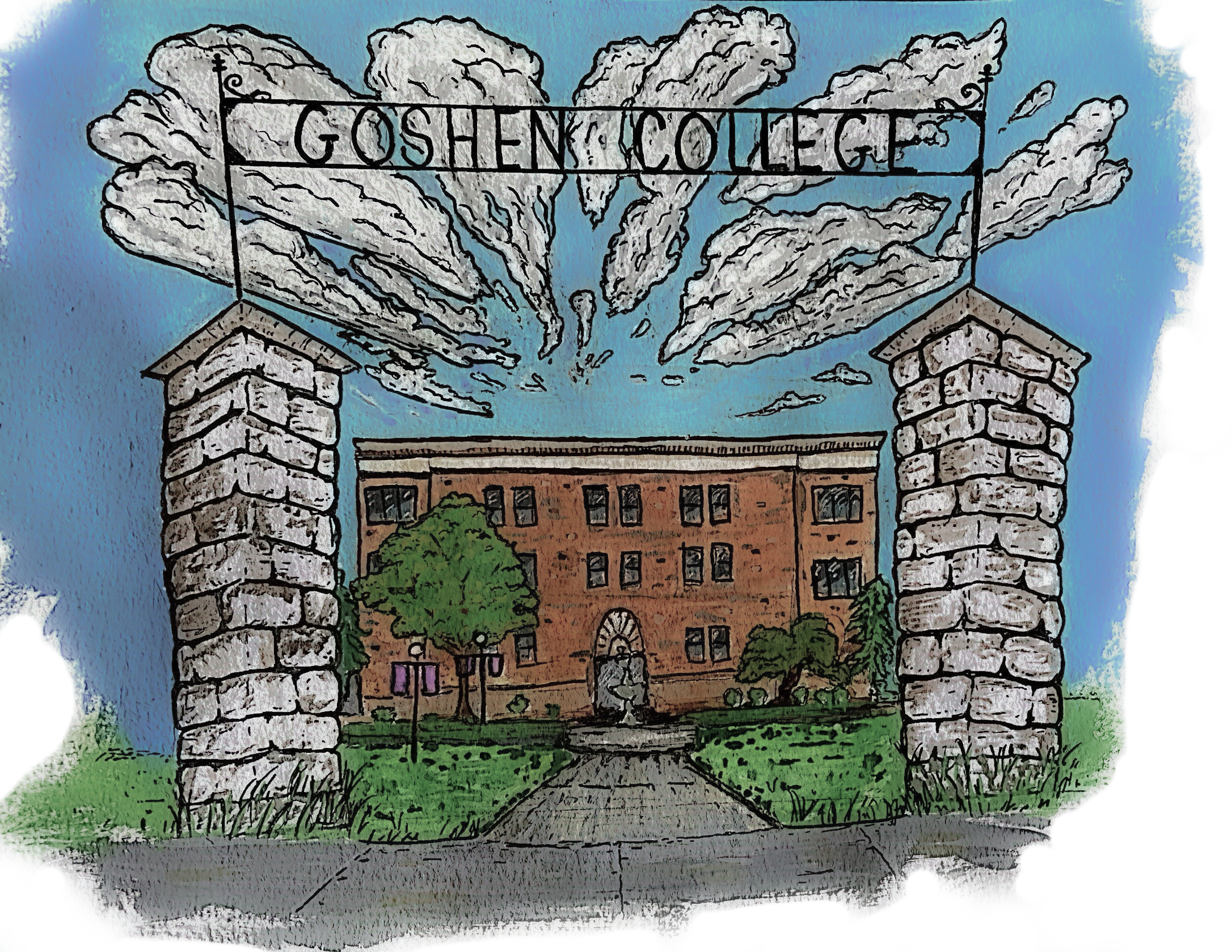In light of the termination of Richard Brunson after his history of sexual harassment was uncovered this spring, The Record took a deep dive into Goshen College’s hiring process, examining both what makes the college a desirable place to work and how it vets candidates.
We’re asked to be almost martyrs for the institution. Institutions can’t love you back.
— Brianne Brenneman
Getting a job opening in front of the right candidates is step one in any hiring process. GC posts job listings to general hiring websites, but also posts to more specific job boards for different roles.
Once a job posting has been seen by a candidate, what makes them want to come to GC? Since Goshen doesn’t compete with big schools in terms of salary, it’s usually the non-financial benefits that are used to draw people in.
“We offer things that other employers don’t offer,” said President Rebecca Stoltzfus. “For faculty, it’s flexibility, autonomy, small class sizes.”
But as the makeup of GC moves away from being mostly Mennonite, do the intangible aspects of the college, like its mission or flexibility, still work to attract candidates?
Stoltzfus said, “The thought for a Mennonite of, ‘I’m gonna teach at a Mennonite school because … the mission of Mennonite schools is super compelling to me,’ that’s less certain than in the past.
“We still have those faculty who are lifelong or intergenerational Mennonites and choosing a Goshen College faculty career, but they’re no longer 80% of our faculty.”
As the student body moves away from being mostly Mennonite, so does the teaching faculty.
“We have faculty who haven’t really heard about Mennonites,” Stoltzfus said. “They got their master’s or Ph.D., found their way here, and then once they’re here are like, ‘huh, this is kind of amazing.’”
“I don’t regard [non-Mennonite professors] as a second-rate solution by any means.”
For some of the current faculty, even those that are Mennonite, the intangible pulls to GC aren’t always enough. Brianne Brenneman, assistant professor of public health, is leaving at the end of the school year, heading to Ann Arbor to pursue a Ph.D., which means her job is posted for next year.
“I think it has to do with buy-in to this ‘service mentality,’” Brenneman said. “I am very service-minded … but sometimes I feel like it’s taken a step too far. We’re asked to be almost martyrs for the institution. Institutions can’t love you back.”
Brenneman said that the salaries for professors have not kept up with the cost of living, and that has been challenging for her, especially as a new parent with a mortgage.
“The way we talk about the institution is: ‘you have to be service-oriented,’” she said. “And I’m like — I can be service-oriented and I could be paid $10,000 more.”
When asked if GC has a hiring problem, Stoltzfus said no, but noted that the whole issue is “a fight across higher ed,” suggesting that finding qualified candidates is a struggle for colleges and universities nationwide.
Checking potential hires
Currently, GC is looking to hire 12 different positions, seven of which are teaching faculty. As various search committees move through the process, how does GC make sure they’re offering the job not only to qualified candidates, but safe ones?
Marlene Penner, human resources director, and Jodi Beyeler, vice president of communications and people strategies, have taken a close look at the hiring process and implemented several new policies in the past year to help search committees make sure they’re making the right decision.
One new policy since Brunson’s termination is red flag training. Penner meets with search committees early in the process to train them on spotting red flags.
“When you’re looking at applications, look for gaps in employment,” Penner said. “Look for dates specifically; if the last one was last year, ask why they haven’t been working since then.”
“We need to ask more questions,” Penner said. “So that we can confirm those types of things, so we’re not just believing everything the applicant is saying.”
Another big change is the search advocate program. Implemented in the fall of 2023, the program trains search advocates who then join all search committees. One such advocate is Dustin George-Miller, the Music Center office coordinator.
The overall role of the search advocate is to minimize bias from the search committee.
“We all come to any kind of decision making with inherent biases,” George-Miller said. “So it’s really my role … to try to have a broad perspective during the entire process and look at what could be potential sources of bias that could creep into the process. … The idea is to try to have a more holistic approach to hiring on campus, because we think that’ll create a more vibrant, larger applicant pool.”
Other new policies from HR include more robust employment verification checks and vetting hires via the Academic Sexual Misconduct Database.
But sometimes the policies aren’t enough. Occasionally, a professor’s past will bring up issues after they’ve been hired. Sometimes they’re brought up and handled in public ways, like with Brunson, but sometimes the issues are dealt with internally.
Stoltzfus said, “Whenever we are made aware of any allegation against an employee that could affect their integrity, or their trustworthiness, or their performance as an employee of Goshen College, we [work] through that on an individual basis.”
Some recent examples include allegations of physical violence made against a current staff member while they were in college, and research by a current faculty member that allegedly harmed survivors of sexual violence.
“I would say that [for] all of those processes that I’ve been involved with, I’ve been very confident of the way that GC has landed,” Stoltzfus said.
It’s always important to make good hiring choices, but some positions, like a resident director, have bigger implications. Chandler Buchfeller, director of residence life and housing, as someone who is partially responsible for hiring RDs, feels the significance.
“If I’m going to hand someone a key that’s going to open up every student’s dorm on campus,” he said, “there are high stakes there, right?”
Doing background checks, calling applicants’ references and providing red flag training are just a few of the ways GC works to ensure the hires they’re making are the right choices.



